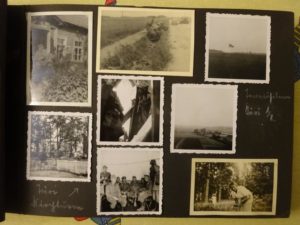Hinweis: Dieser Blogpost erschien zuerst auf dem Blog Public Humanities, herausgegeben von Lisa Kol...
Job Österreichische Nationalbibliothek für DH Projektmanagement
Für die Hauptabteilung Digitale Bibliothek/Abteilung für Forschung und Entwicklung suchen wir zum Eintritt per 1. Oktober 2021 eine/n engagierte/n
ProjektmanagerIn Schwerpunkt Digital Humanities
(20,00 Stunden/Woche)
Ihre Aufgaben
- Projektmanagement von Forschungs- und Umsetzungsprojekten im Bereich Digital Humanities, insbesondere für Digitale Editionen und „Austrian Books Online“
- Betreuung und konzeptionelle Weiterentwicklung der Infrastruktur für digitale Editionen (https://edition.onb.ac.at) sowie Datenmodellierung, Beratung und konzeptionelle Unterstützung von Editionsteams bei der Erstellung von digitalen Editionen
- Mitarbeit an der Entwicklung von Datenservices für die Forschung („Collections as Data“)
[...]
Quelle: https://dhd-blog.org/?p=16271
„Die unglaubliche Not des bayerischen Ostens“. Regierungstechniken im Bayerischen Wald, 1924-1933.
Autorin: Anna Lehner Das Hannah-Arendt-Institut veranstaltete am 23. und 24....
„Die Vigilanz-Brille hat schon eine sensibilisierende Wirkung“: 10 Fragen an Ralf Kölbel
In unserer Enthüllungs-Serie VIGILEAKS stellen wir die Teilprojektleiterinnen und Teilprojektle...
Gerahmte Gewalt
Empirisch fundierte Studien zur Produktion, Funktion und Wirkung von privaten Fotoalben im „Dritten Reich“ sind selten.1 Forschungsdefizite bestehen selbst für Alben von Deutschen, die in der osteuropäischen Kernregion des Holocaust eingesetzt waren und ihre Kriegseindrücke nach Hause brachten. Dieser Befund erstaunt umso mehr, als Alben weitaus besser als lose Fotos Geschichten erzählen, deren Inhalte und Lesarten trotz der fixen, scheinbar unveränderlichen Sequentialität der Bilder hochgradig flexibel sind und sich für Erinnerungsdiskurse im Kontext kollektiver Identitätsstiftung besonders eignen.
Abb. 1: Seite aus dem Album „Der Feldzug in Polen“ von Wehrmacht-Leutnant W., August 1939; Quelle: Bundesarchiv Abt. Militärarchiv Freiburg (MSG 2/19124) mit freundlicher Genehmigung. Vergrößern
[...]
Quelle: https://visual-history.de/2021/07/21/gerahmte-gewalt/
GAG304: Der Falschgeldbetrug von Alves dos Reis
1925 erschütterte eine große Banknotenkrise Portugal: Mit einem dreisten, aber genialen Trick sorgte Alves dos Reis für einen der größten Geldfälschungsskandale überhaupt. Er fälschte die Geldscheine nicht in mühevoller Kleinarbeit, sondern ließ sie in großem Maßstab von einer offiziellen Druckerei herstellen – und eine eigens gegründete Bank nutzte er, um das Geld zu waschen und in Umlauf zu bringen.
Wir sprechen in der Folge darüber, wie es Reis gelungen ist, eine Druckerei in London von seinem Vorhaben zu überzeugen. Waterlow and Sons hat schließlich 580.000 Banknoten geliefert, hergestellt mit den echten Escudo-Druckplatten, mit einem Wert von 290 Millionen Escudos. Das entsprach immerhin 16,5 Prozent der Gesamtmenge an Banknoten, die gerade in Portugal zirkulierten.
AUS UNSERER WERBUNG
So kommt ihr zum 30-Euro Amazon Gutschein von CLARK:
Anmeldung mit dem Code „GESCHICHTE“ unter www.clark.
[...]
doing | public | history – Intro III
Warum jetzt einen Blog? Im Jahr 2021 mag es ungewöhnlich anmuten, einen Wissenschaftsblog zu starten...
Die Herrschaft Abwesender im Spätmittelalter
1000 Worte Forschung: Abgeschlossene Dissertation in Mittelalterlicher...
Digitale Heimatforschung mit Wikidata – ein Workshopbericht über verlinkendes Datendenken
Warum sollten Heimatforschende Wikidata benutzen? In zwei Onlinekursen des Sächsischen Landeskurator...
Das Praxisnetzwerk der HSE: Unterstützung bei der beruflichen Orientierung im Lehramtsstudium
Von Ruurd Bruin Die schulpraktischen Lernphasen stellen einen wichtigen Baustein des Lehramtsstudie...
Quelle: https://hse.hypotheses.org/2803
